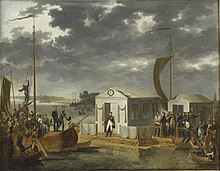Grand Duke Konstantin Pavlovich of Russia
[1] Konstantin was born in Tsarskoye Selo on 27 April 1779, the second son of the Tsesarevich Paul Petrovich and his wife Maria Fyodorovna, daughter of Friedrich II Eugen, Duke of Württemberg.According to the British ambassador James Harris,[3] Prince Potemkin's mind is constantly taken up with the idea of creating an empire in the East; he has managed to fascinate the Empress with these feelings, and she proved so subject to his chimeras that she christened the new-born Grand Prince Constantine, gave him as nursemaid a Greek by the name of Helen, and talks in her own circles about how to place him on the throne of the Eastern empire.At the same time she is setting up a town at Tsarskoe Selo to be called Konstantingorod.The direction of the boy's upbringing was entirely in the hands of his grandmother, the empress Catherine II.As in the case of her eldest grandson (afterwards the emperor Alexander I), she regulated every detail of his physical and mental education; but in accordance with her usual custom, she left the carrying out of her views to the men who were in her confidence.Count Nikolai Saltykov was supposed to be the actual tutor, but he too in his turn transferred the burden to another, interfering personally only on exceptional occasions, and exercised no influence upon the character of the passionate, restless and headstrong boy.In retaliation, he had her kidnapped and brought to his Marble Palace where “he and his aides beat and gang-raped her, starting with generals, then officers and finally servants and guardsmen, breaking her legs and arms.The battle of Bassignana was lost by Konstantin's fault; but at Novi he distinguished himself by personal bravery, so that the emperor Paul bestowed on him the title of tsesarevich, which according to the fundamental law of the constitution belonged only to the heir to the throne.In Congress Poland, he received the post of commander-in-chief of the forces of the kingdom to which was added in 1819 the command of the Lithuanian troops and of those of the Russian provinces that had belonged to the Polish–Lithuanian Commonwealth (so called Western Krai).Classical liberals lapped up the freedoms of education, scholarship and economic development, but key deficiencies in Poland's autonomy like lack of control over the budget, military, and trade left them hungry for more.Alexander, calling their actions an "abuse" of liberty, suspended the Polish parliament (Sejm) for five years and authorised Konstantin to maintain order in the kingdom by any means necessary.[9] Konstantin, attempting to execute his brother's mandate to silence dissent, strengthened the secret police (Ochrana) and suppressed the Polish patriotic movements, leading to further popular discontent.Konstantin also harassed the liberal opposition, replaced Poles with Russians on important posts in local administration and the army and often insulted and assaulted his subordinates, which led to conflicts in the officer corps.Konstantin hindered the unveiling of the organized plotting for independence, which had been going on in Poland for many years, and held obstinately to the belief that the army and the bureaucracy were loyally devoted to the Russian Empire.Polish Prince Ksawery Lubecki, realizing that the insurgents had formed no government by midnight, assembled some members of the council and other prominent personalities on his own initiative.Either he would be viewed by the Russian royal family as weak and sympathetic to the Poles, or he would be seen as a seed for the idea of a soon to be independent Poland, but he was effectively only trying to avoid a wider war.





George DaweTsarskoye SeloSaint Petersburg GovernorateRussian EmpireVitebskPeter and Paul CathedralPrincess Juliane of Saxe-Coburg-SaalfeldJoanna GrudzińskaKonstantinHolstein-Gottorp-RomanovPaul I of RussiaSophie Dorothea of WürttembergRussiangrand dukeRussiaEmperorPaul Iheir-presumptiveAlexander INicholasDecembrist revoltetiquetteTsesarevich Paul PetrovichMaria FyodorovnaFriedrich II EugenDuke of WürttembergCatherine the GreatConstantine the GreatEastern Roman EmpireGreek PlanJames HarrisPrince PotemkinTsarskoe SeloEmperor PaulCatherine IINikolai SaltykovCesar La HarpeJuliane of Saxe-Coburg-SaalfeldCaroline BauerBattle of NoviSuvorovbattle of BassignanatsesarevichImperial Guardsbattle of AusterlitzFrench Imperial EagleThe Meeting of Napoleon I and Tsar Alexander I at TilsitAdolphe Roehnpeace of TilsitNapoleonKutuzovBarclay de TollyDresdenLa Fère-ChampenoiseCongress Polandviceroynamestnik of the Kingdom of Polandcommander-in-chiefLithuanianPolish–Lithuanian CommonwealthWestern KraiRestorationClassical liberalsKalisz OppositionBonawenturaWincenty NiemojowskiOchranaliberal oppositionofficer corpspersonal unionconstitutionWirydianna FiszerowaMaria Agata SzymanowskaFrédéric ChopinCountess Joanna GrudzińskaRussian interregnum of 1825Constantine rublesilverNorthern SocietyNicholas ITurkish WarNovember UprisingKsawery LubeckicholeraPolish literatureFrederick II Eugene, Duke of WürttembergKnight of St. AndrewKnight of St. Alexander NevskyKnight of St. AnnaOrder of St. John of JerusalemKnight of St. GeorgeKnight of St. VladimirHabsburg MonarchyMilitary Order of Maria TheresaTwo SiciliesKnight of St. JanuariusGrand Cross of St. Ferdinand and MeritSwedenKnight of the SeraphimGrand Cross of the Sword, 1st ClassKingdom of PrussiaKnight of the Black EagleFranceFrench EmpireLegion of HonourKingdom of FranceKnight of the Holy SpiritKingdom of BavariaMilitary Order of Max JosephKingdom of SardiniaKnight of the AnnunciationWürttembergGrand Cross of the Military Merit OrderKnight of the Golden FleeceNetherlandsGrand Cross of the Military William OrderKingdom of SaxonyKnight of the Rue CrownCharles Frederick, Duke of Holstein-GottorpPeter III of RussiaGrand Duchess Anna Petrovna of RussiaChristian August, Prince of Anhalt-ZerbstCatherine II of RussiaPrincess Johanna Elisabeth of Holstein-GottorpCharles Alexander, Duke of WürttembergFrederick II Eugene of Württemberg